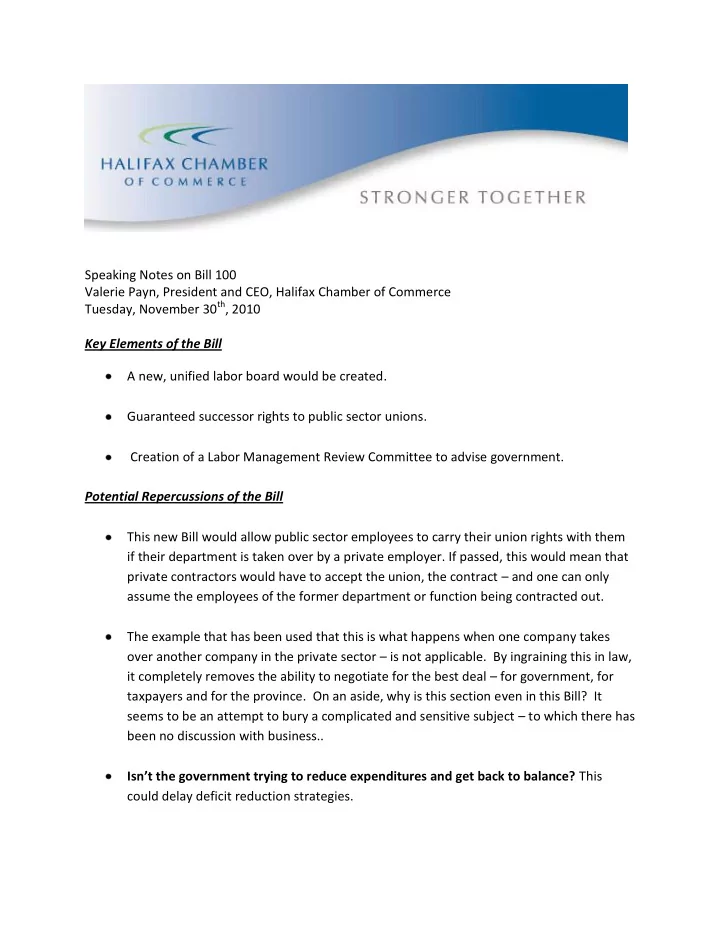

Speaking Notes on Bill 100 Valerie Payn, President and CEO, Halifax Chamber of Commerce Tuesday, November 30 th , 2010 Key Elements of the Bill A new, unified labor board would be created. Guaranteed successor rights to public sector unions. Creation of a Labor Management Review Committee to advise government. Potential Repercussions of the Bill This new Bill would allow public sector employees to carry their union rights with them if their department is taken over by a private employer. If passed, this would mean that private contractors would have to accept the union, the contract – and one can only assume the employees of the former department or function being contracted out. The example that has been used that this is what happens when one company takes over another company in the private sector – is not applicable. By ingraining this in law, it completely removes the ability to negotiate for the best deal – for government, for taxpayers and for the province. On an aside, why is this section even in this Bill? It seems to be an attempt to bury a complicated and sensitive subject – to which there has been no discussion with business.. I sn’t the government trying to reduce expenditures and get back to balance? This could delay deficit reduction strategies.
While this is indeed a good deal for public sector employees, the disadvantage clearly lies on the shoulders of the private sector, as they would be forced to match the compensation of public sector unionized workers. The unintended consequence of the Bill as it now reads, is that private sector companies will be unwilling and unable to participate to allow the government to reduce expenditures through contracting out of services or functions. This part of the Bill is a “deal breaker” for the contracting out of government services. No representation for private sector non-unionized Nova Scotia workers – and there are many (representing over 80% of private sector workplaces in the province). Unintended consequences for the small business community when we are all still in recovery mode from the recession. Key messages from Press Release The forced extension of successor rights to contracting out situations could significantly limit current and future government’s ability to explore priv ate sector based solutions. It would also significantly limit the contractor in improving the efficiency and effectiveness of the service. Regarding the establishment of a Labor Management Review Committee several questions arise: What is the proposed mandate? What would the responsibility of the committee be? What is the composition of this Committee? It would seem that thoughtful reflection is needed to allow for full consultation on what these clauses will mean to the business community. With the tremendous fanfare last week releasing the province’s Economic Development Strategy – jobsHere , it would seem very untimely to be considering labor relations policy that could weigh heavily on Nova Scotia businesses, particularly the small business sector without proper consultation. We all know that small businesses make up the majority of businesses in our province. If you are asking business to ‘step up’, this is not the time to put barriers in their way. What we’re looking fo r Presently, Nova Scotia, British Columbia and PEI are the only three Canadian provinces without a single labor and employment board – this is not what we are opposing in and of itself. Rather, we are concerned with the underlying implications of this action. The establishment of a new Labor Management Review Committee is concerning because it
has the power to review labor relations legislation in our province and make recommendations on this legislation – if this committee is not balanced by representatives from non-unionized private sector employees, how can we guarantee equitable labor relations policy decisions? A much greater degree of public consultation – that specifically includes the business community. Make it easier for government to do business with the private sector – not harder. The last thing we need is to make it more difficult for government to work with business towards less costly solutions for projects. We encourage Minister More to delay this Bill, and take the time to have departmental staff discuss the new additional clauses with the business community.
Recommend
More recommend